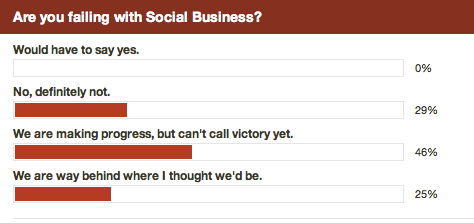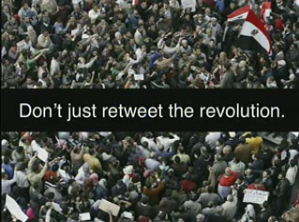It takes a village to raise a tectonic shift in the way companies communicate and operate at scale. No, it will take a network of connected villages. And it will take over a decade to get past the early adoption phase for social business transformation inside large enterprises. A few threads and blog posts are prompting me to write a few thoughts on where we are in the evolution of social business maturity. The one that most notably hit home for me was Luis Suarez’s Willy Loman, Death of a SocBiz/E20 Evangelist post this week: Dear Social Business Evangelist Where Art Thou?

We discussed Luis’s post internally in the Council, and it falls on the heels of another conversation we had recently regarding the perception that internal social business transformation is failing or has failed in many companies.
This poll is very informal, and granted, we have a survey bias in that all Council members are working hard to bring social transformation to their enterprises. Yet, there are ZERO failures reported and even the 25% of the members who indicated they feel they’re way behind are not “giving up.” All our members recognize this is a long haul and are putting in place the mechanisms to realize a fully-integrated social business in thought and deed.
Some Council member comments:
“If this is failure, I couldn’t handle success.”
“On the other side of the hype curve is a plateau, not a canyon.”
“No. Not at all. Do we have 100% adoption in the company and every single employee conducting every single work activity in a social way? No. Have we changed the way a significant number of people in the company (let’s say somewhere between 30% and 50%) look to solve their problems, voice the opinions, raise ideas to places they could have rarely reached before? Yep. Have we impacted employee engagement scores in a positive way? Yep. Is the cost vs. the benefit so prohibitive that is gives execs pause to consider the ROI more closely? Not even remotely. They are bought in to the value. Are execs sharing openly and daily? Nope. Some are trying though…some better than others. Are execs supportive of the conversation taking place and willing to jump in occasionally when the attention level and criticality warrant doing so? Yep. Can I keep up with the demand of people requesting consulting about ideas on how to leverage “social” in their business areas in ways we never even considered? Barely.”
“+1 to [Council member] in his comment about changing “measure” to “observe”. I would ask the naysayers if they’ve ever heard about Lean. Social tools and their usage patterns are allowing us to collaborate more effectively and to make work visible so it can be improved. Activities. Connections. Flowpaths. Improvement. These are the four “rules in use”. On a factory floor, improvement comes from the ability to see how activities interconnect to get parts out the door. I would argue that a fundamental, basic problem with knowledge work as most people do it is that it went underground with desktop productivity and email. It is completely invisible. With the use of social tools and their integration into the flow of “real business transactions” (such as Chatter, etc…) – that’s how we make the work visible so we can improve it. That’s where I see value in companies like mine; It is certainly not in, ‘hey ya’ll, we have a blog, documentation wiki, and micro-sharing activity stream so now we’ll be more profitable.'”
“Without our [social software platform], there is simply no way that our corporate culture would have had the major shift it has in the last four years. And that shift has allowed [Council company] to completely transform our business from [a dying model to a thriving one].”
“+1 to [Council member’s] ten-year adoption, as I always see it as our long journey towards a high mountain range. After nearly 2 years of ground works, I consider we are just passing the first base-camp – the “awareness” camp. We start to see some paths leading us toward the 2nd camp, but not the whole path to the end.. not yet. Yes, we haven’t reached the end and we are not able to measure where we are, but we know we are in progress – step-by-step.”
“This is no different than adoption of a new technology that changes the way we work dramatically, and how we communicate. I bet that the history of email adoption in the past is no different, and had the same resistance. Changing the way we communicate, which has been done for decades, and people who have lived for decades in that mode in not going to happen overnight. When people come to work, they want to be productive, and want to understand how communicating in a different manner will achieve their end goals. I believe this is at least a 5 year journey… I have worked at multiple companies, and when the top leadership makes a direction change, or wants to align multiple fragmented divisions together, that change takes 5 years or more since it is about changing the culture, how people work with each other, and they want to align themselves to the new strategy. Also, people changes are made to enable faster traction. In the social journey, if we don’t give the same importance, have top leadership backing, and put the right people in the right place, the journey will be slow, and organic. I am a strong believer and proponent of this social journey, and I see success down the line!
In short, the era of evangelism is over and we should all be rejoicing that the suits are showing up. One of our members said, “I’m sending the suits.” At the core of the transformation, however, is the ideals that innovator/disrupters like Luis Suarez and many more of my e20 friends have championed from the beginning: transparency, collaboration/sharing, authenticity, and even trust. Trust may be the most difficult challenge for the 21st century enterprise, and I sometimes wonder if all companies can succeed here. (See this exceptional post on “Relational Trust” by Peter Stoyko that explains this elegantly.) But, at the end of the day, the planks of humanizing the enterprise will succeed, along with the commercial interest all profit-oriented enterprises have in generating returns for their stakeholders.
The directive for all evangelists has moved from enlightenment to engagement. The drive to deliver social engagement at scale is the next crusade. I’m interested to see the role that gamification companies such as Badgeville and Bunchball will bring to the social business sector, as well as innovative metrics and dashboards that are being developed such as Moxie Software is creating for its clients that measure and report on business outcomes vs. platform activity. As the customer marketing (heretofore social media/SCRM) data begins to pour through the pipes in the firewall, the ability to measure and make sense of that social engagement will be even more profound. The development team here at Dachis Group is building a formidable arsenal of tools and services to measure this kind of engagement at scale, as well. (Sign up!) We are still in the early stages of the transformation that so many of us predicted and, to some degree, made happen. The challenge for every company is to stop trying to homogenize the market and rather celebrate the diversity of approaches that exist to succeeding with social business. Each enterprise has its unique opportunity to succeed in this space, and it still takes the courage and creativity of the Intrapreneur to identify these opportunities, spur adoption of these new principles, and ferret out the next one. So, the evangelist’s job has become more serious and less pious. And that only means we are succeeding and growing, in real business terms. Everybody take a bow. And put on your suit. This is happening.




